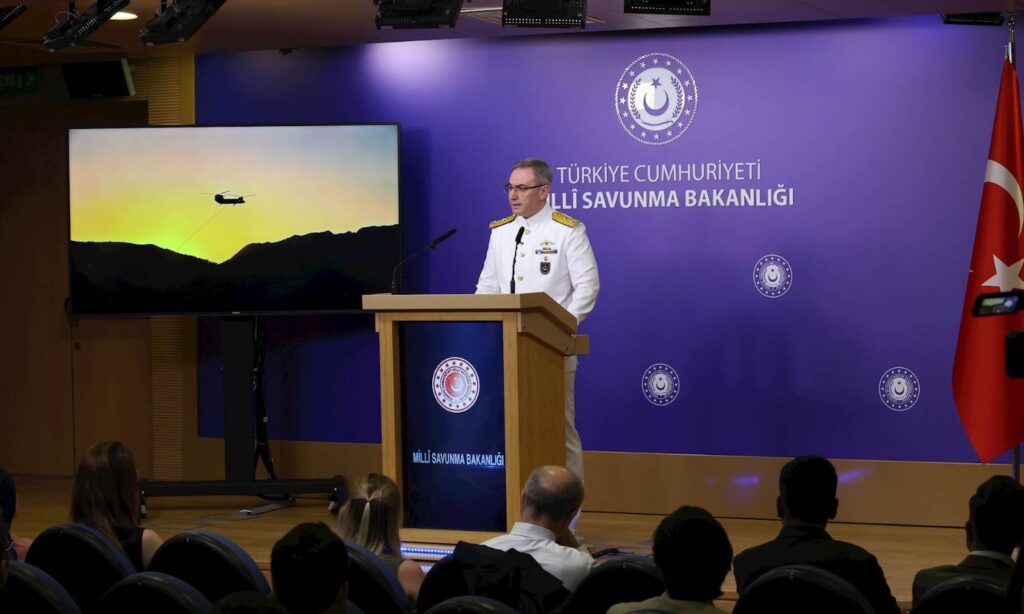Turkey welcomed the establishment of a new Russian military base in Ain al-Arab/Kobani, northern Aleppo, near the Syrian-Turkish border.
The Turkish Ministry of Defense said in a press statement yesterday, Thursday, August 8, that it evaluates this action as a “weakening of the presence of the PKK/SDF/PYD-YPG terrorist organization in the area.”
Turkey considers the Syrian Democratic Forces (SDF) an extension of the banned and designated terrorist Kurdistan Workers’ Party (PKK).
According to the Turkish channel TRT Haber, the Ministry of Defense regarded the establishment of the base as part of the implementation of the agreements signed with the United States and Russia, which include measures to withdraw “terrorist” elements to a specific area.
The Turkish Ministry of Defense added that it considers any action implemented in this context as positive since the signing of the agreements, and what is important for Turkey is the security of its borders and its people.
On Saturday, August 2, 2024, Russia announced the establishment of a new military base in the Ain al-Arab region.
Colonel Oleg Ignasyuk, Deputy Director of the Russian Reconciliation Center in Syria, said that the establishment of the base came as part of ongoing measures “to monitor the ceasefire between the conflicting parties.”
Local media comments
The Al-Watan newspaper, close to the regime, reported on Wednesday from what it called “observers of the field situation” that the establishment of the joint “Syrian-Russian” military base in Ain al-Arab “constitutes an important shift to impose stability in one of the most strategically contested areas.”
It defuses the situation by “nullifying the pretexts and arguments” of Turkey to control it.
The purpose of establishing the base, according to Al-Watan sources, is to prevent Turkish President Recep Tayyip Erdoğan’s administration from occupying Ain al-Arab, which he has continuously threatened to control.
Establishing the base at this tense time contributes to “reassuring Erdoğan’s administration by preventing any hostile actions from emanating from Ain al-Arab into Turkish territory,” according to the newspaper.
It also contributes to providing some protection for the Turkish border in this troubled area, according to Al-Watan sources.
Russian-Turkish agreement
Russia’s first military presence in Ain al-Arab began in October 2019, during the Peace Spring operation carried out by the Turkish army and the Syrian National Army (SNA) against the Syrian Democratic Forces (SDF) east of the Euphrates.
During the Peace Spring operation, the United States withdrew from several military bases in the countryside of Aleppo, Raqqa, and al-Hasakah as part of Washington’s plan to withdraw its forces and reposition them east of the Euphrates.
In parallel, Russia quickly entered its forces into these bases, including the Sarrin airbase near Ain al-Arab, marking its first presence in the region.
During the Peace Spring operation, Turkey and the National Army controlled the cities of Tel Abyad, north of Raqqa, and Ras al-Ain, northwest of al-Hasakah. Military operations stopped at the time with an agreement between Turkish President Recep Tayyip Erdoğan and Russian President Vladimir Putin on October 22, 2019.
Both sides agreed to withdraw all US-backed SDF forces from the Syrian border strip to a depth of 30 kilometers and withdraw their weapons from the cities of Manbij and Tel Rifaat in Aleppo countryside, in addition to joint Turkish and Russian patrols west and east of the Peace Spring operation area to a depth of ten kilometers, excluding the city of Qamishli.
Later, Turkey demanded the implementation of the withdrawal provisions of the SDF from the border strip, which had not been adhered to. However, the Peace Spring operation and subsequent agreement allowed regime and Russian forces to enter areas east of the Euphrates for the first time since 2012 and establish several military points and bases.
Many SDF military points, especially those at the borders and important points in Tel Rifaat and Manbij, hoisted the Russian and regime flags to avoid Turkish targeting.











